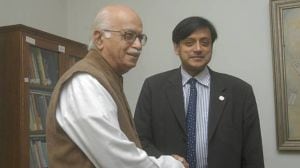A brief history of meaning
The British Empire, which once comprised one-quarter of the globe, has dwindled to little more than its original island kingdom, but English...

The British Empire, which once comprised one-quarter of the globe, has dwindled to little more than its original island kingdom, but English is everywhere. When the American Empire follows in due course, English, like Latin, looks to outlive mere political power as a world language.
The richness of this extraordinary tongue and its history lie in the Oxford English Dictionary, one of the greatest scholarly endeavours in history. Its story is now told in Simon Winchester’s The Meaning of Everything: The Story of the Oxford English Dictionary. Winchester earlier wrote The Professor and the Madman, the account of William Chester Minor, an American, a paranoid schizophrenic and a murderer who contributed thousands of citations to the dictionary over a period of 21 years.
The main figure of the enterprise is James A.H. Murray, a provincial schoolmaster who became editor of the OED in 1879 and struggled with an ever-growing mountain of slips — individual pieces of paper, each with a citation for a word —until dying in 1915 in the middle of the letter T.
Murray’s biography has been written by his granddaughter, K.M. Elisabeth Murray, Caught in the Web of Words, published in 1977 and blessedly still in print.
The product of 71 years of work by Murray, other editors and an army of volunteers who sent in words and illustrative quotations arrived in the spring of 1928: 414,825 words and 1,827,306 illustrative quotations printed in a dozen volumes.
The project was celebrated in a grand dinner for 150 notables, with an address by Prime Minister Stanley Baldwin. Winchester gives a memorable account of this dinner, including the menu.
But English being a language that never stands still, the work goes on. A supplement was produced in 1933 to include words overlooked or new to the language since the middle of Victoria’s reign. Four more supplementary volumes appeared between 1972 and 1986.
The second edition — 20 volumes, 615,100 words, 2,436,600 quotations — arrived in 1989. The next edition, comprising one million words, might exist only in electronic form, on the Internet at http://www.oed.com, as a printed version would require 40 volumes.
Winchester’s account of this immense work has a fine set-piece in the opening chapter on the celebratory dinner in 1928, a potted history of the language, material on Murray deeply indebted to Elisabeth Murray’s affectionate biography, and a condensation of his own book on the madman Minor.
It is disappointingly skimpy in the passages on Murray’s successors, among them William Craigie, C.T. Onions and R.W. Burchfield. One would also like to know details about the means by which the labour of harvesting citations has passed from indomitable Victorian volunteers to a corps of lexicographers. His account is highly readable, and the endeavour he records is a noble one.(LAT-WP)



- 01
- 02
- 03
- 04
- 05




























